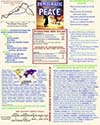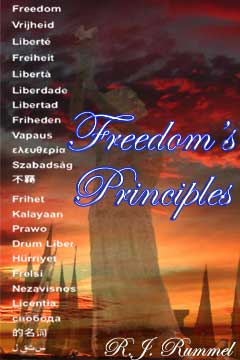[First published January 9, 2006] I’ve included below an article I had written for a Swiss newspaper Dagens Nyheter (thanks to Mathias Sundin for submitting it), but which was rejected. So, I submitted it to myself and decided to accept it for my blog. I’m pleased to publish it for me.
Eliminating Genocide and War
Through an Alliance of Democracies
There are many complex considerations and theoretical issues to the problem of war and democide. There are the questions of general and immediate causation, and of aggravating and inhibiting conditions. There are the practical questions of how to gather timely intelligence about them and inform decision makers about what is known, how to influence the political process through which intervention against democide is decided, and how to give democide and war elsewhere the required prominence in the complex of perceived interests. And with regard to intervening to stop democide, there are the questions concerning the national mix of the necessary troops, their weapons, and the rules of engagement.
Many of the answers to these questions will fall into place if we recognize three facts and one practical necessity that cuts through the jumble of questions and problems involved. The one fact is that democracies by far have had the least domestic democide, and now with their extensive liberalization, have virtually none. Therefore, democratization (not just electoral democracies, but liberal democratization in terms of civil and political rights and liberties) provides the long run hope for the elimination of democide.
The second fact is that democracies don’t make war on each other and that the more democratic two governments, the less the likelihood of violence between them. Not only is democracy a solution to democide, therefore, but globalizing democracy is also a solution to war. That the world is progressively becoming more democratic, with from 22 democracies in 1950 to something like 119 democracies today (about 89 of them liberal democracies comprising about 2.8 billion people) out of 192 nations, makes it increasingly likely that in the long run the twin horrors of democide and war will be eliminated from human society.
The final fact is that democratization is central to the national interest of all these democracies. A fundamental national interest of a democracy is peace—the avoidance of war—and international trade and prosperity. What is the best way overall to avoid war and promote prosperity in the long run? Through the promotion of democratization. Democracies not only don’t make war on each other, democracy is an engine of wealth and prosperity. And no democracy has ever had a famine.
And the practical necessity is this. We must recognize that the United Nations is inadequate to the task of humanitarian intervention to stop democide, the promotion of democracy, dealing with HYPERLINK “http://freedomspeace.blogspot.com/2004/12/on-thugsvilleoops-undealing-with.html”global threats, protecting and advancing HYPERLINK “http://freedomspeace.blogspot.com/2005/02/un-united-thugs-and-human-rights.html”human rights, and it has failed in doing that for which it was chartered, HYPERLINK “http://freedomspeace.blogspot.com/2005/03/un-united-thugs-and-humanitys-hope.html”peacekeeping. Finally, it treats Israel with such HYPERLINK “http://freedomspeace.blogspot.com/2005/03/uns-united-thugs-shameful-antisemitism.html”prejudice and hostility, that were it a corporation in a democracy, UN Secretary-General Kofi Annan Kofi Annan and his underlings would be now have gone to jail for systematic, hateful discrimination.
How to explain this travesty on our initial hopes for the UN? Simple. The United Nations has become a corrupt weapon and a shield for the world’s thug regimes. And the HYPERLINK “http://freedomspeace.blogspot.com/2005/03/kofi-annans-fatally-flawed-fix.html”ambitious UN reforms proposed in March 2005 by Kofi Annan did not deal with this fundamental problem. In Annan’s invocation of freedom, human rights, democracy, and human security, in his call for UN members to support these moral causes, he deserves credit. As to his suggested reforms, such as of the Security Council and Human Rights Commission, I could point to organizational, and process problems, but this would ignore the most fundamental problem of all. It is a fatal fault that Annan refuses, quite understandably, to mention; and the solution was impossible for him to suggest as it was for the 2005 world summit that met in September 2005 to consider Annan’s reforms.
If a family of skunks lives underneath a house, no amount of remodeling of the upstairs will eliminate the stench. Likewise, no amount of remodeling of the UN will change the fact that its membership consists of about 103 partly free and non-free nations, many of which are pure and simple thugdoms (Syria, Sudan, Iran, N. Korea, China, Burma, Saudi Arabia, Libya, Cuba, Vietnam, Laos, etc). They will act together to trash, alter to their advantage, or use the reforms Annan recommends to attack free countries, as has been seen in the recent world summit. Their membership is the fatal flaw. And the related and impossible solution would be to kick them all out.
What to do about it?
I don’t suggest withdrawing from the UN. It has too many useful functions and specialized agencies, such as the Food and Agricultural Organization, World Health Organization, International Monetary Fund, and the Universal Postal Union. The General Assembly and Security Council serve as a forum for contact and communication between adversaries or enemies. When there is general agreement on conflicts, interventions, peacekeeping, refugees, humanitarian aid, sanctions, criminal tribunals, human rights, and so on, the UN saves lives and promotes human welfare and security. Nonetheless, it is clear to me from the UN’s overall record that with the millions dying from war, democide (about 6,000 a month in Darfur, Sudan alone), famine (millions in North Korea), and poverty, the good of the organization is still much too limited by its thug regimes. Understanding all this, two things should be done.
Since democratic societies create among themselves a zone of peace, there should be an intergovernmental organization of all democracies outside of the UN to deal with issues about which the UN cannot or will not act, but particularly to further the promotion of peace, human security, human rights, and democracy — an Alliance of Democracies. Given what I have pointed out about the UN’s problems, the need for such an alliance is obvious. It would not compete with the UN where that body could act to promote democratic values. But, where it could not, particularly because of the opposition of the thug regimes, then the Alliance would serve a most useful cause.
This is now in the works. Democratic activists, practitioners, academics, policy makers, and funders, have come together to cooperate to promote democracy. They call this a World Movement for Democracy (WMD). It has its own website, publications, regular online Democracy News, courses, a steering committee, secretariat, and periodic assemblies. Its first and organizing Assembly was held in India in 1999; its second in Brazil in 2000 involved democrats from 93 countries, and a third meeting in Durbin, south Africa in 2004 involved 600 participants from 120 countries. The stated purpose of the organization is “to strengthen democracy where it is weak, to reform and invigorate democracy even where it is longstanding, and to bolster pro-democracy groups in countries that have not yet entered a process of democratic transition.”
There also is the new Community of Democracies (COD). Foreign ministers and representatives of 106 democratic governments met in Warsaw, Poland, in 2000 and concluded with the “Final Warsaw Declaration: Toward a Community of Democracies”. This expressed their unified “commitment to promote, strengthen and preserve democracy.”
And then there was a meeting in Warsaw of a non-governmental first World Forum on Democracy. “It included 300 democratic activists, current and former political leaders, academics, and nongovernmental organization representatives from 85 countries. Its purpose was to discuss and advance “democratic governance and values throughout the world.” President Clinton’s Secretary of State Albright addressed the forum, and pointed out that, “We need a true democratic community; defined not by what we are against, but by what we are for; enshrined by leaders from every point on the compass; and strengthened by the full participation of civil society.” Its second meeting was held in Seoul in 2003, and a third Ministerial meeting was held in April in Santiago, Chile, to which American Secretary Rice led the American delegation. The Community of Democracies (COD) is Alliance of Democracies yet in its infancy. Now the democracies should strengthen its organization and functions, and better focus its efforts on a forward strategy of freedom (to borrow President Bush’s phrase).
But, all this is outside of the UN. What goes on in the UN cannot and should not be ignored. The democracies must act together on vital UN issues. The COD recognized this, and mandated the creation of a UN Democracy Caucus. Its convening group was Chile, Czech Republic, India, Mali, Mexico, Poland, Portugal, Republic of Korea, South Africa, and the United States. The caucus has a website. But, it still is only a consultative and collaborative group among democracies, and is not like a political party — a Freedom Party. Such the caucus should become, with a program of democratization, peace making, and peace keeping, all overseen by a chairman, whip, and all that. After all, the UN is a world government with a legislature, executive, administration, and judiciary, and well suited to organized politics.
Much progress toward democracy is being made, and increasingly democratic leaders are recognizing that democracy is not only the in the national interest, but also crucial to them. In this, there is the greatest hope of eliminating war, and with it the democide that has become widely recognized as deadlier than war and the world’s worst evil.



 Posted by rudyrummel
Posted by rudyrummel 






